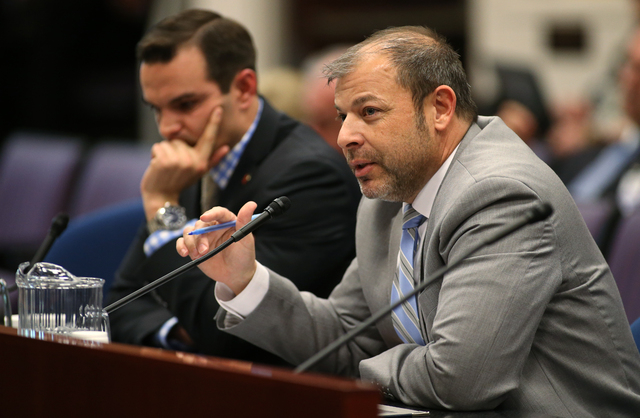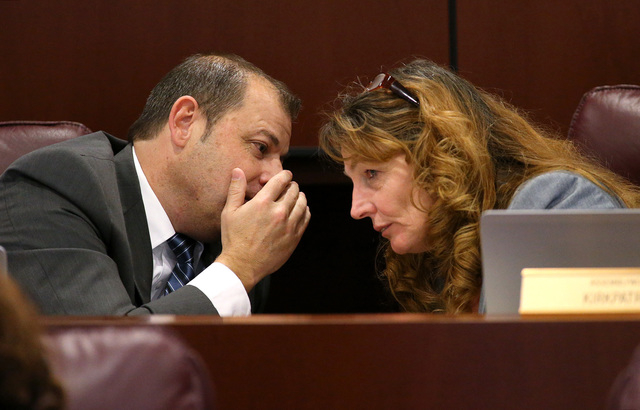Things to start popping at Legislature with revenue forecast


CARSON CITY — The beginning of the end game is about to ratchet up in the Nevada Legislature.
The Economic Forum has made its prediction of how much tax revenue the state can expect under existing law over the next two years. Legislative money committees are closing budgets.
Now the focus turns to filling the gap to fund Gov. Brian Sandoval’s $7.3 billion budget plan.
The state Senate approved Sandoval’s proposal to jigger business license fees and tie them to gross receipts to raise an extra $250 million a year. But Senate Bill 252 is unlikely to survive in its original form. It’s now in the Assembly, where a competing tax plan, Assembly Bill 464, has yet to be fully vetted, and a core group of conservative Republicans are saying “no way, no how” to any tax hike.
AB464 would expand and increase Nevada’s existing modified business tax to raise about $544 million in new revenue. It would boost the rate assessed on payroll to 1.56 percent from the current 1.17 percent. Businesses with less than $200,000 a year in payroll would not pay the tax. Financial institutions would see a rate reduction from the 2 percent they pay now. The business license fee currently at $200 a year for all businesses would rise to $500 for corporations and $300 for noncorporate businesses.
“Obviously it’s going to be the big issue … are they going to support SB252, the governor’s business license fee, or portions of AB464? Those are the two tools going forward,” said Mike Willden, Sandoval’s chief of staff.
“My guess is neither bill will come out in its current form. There will be some negotiations in between … and less than a month to get that figured out.”
Lawmakers face a deadline of midnight June 1 to wrap up things or face a special session.
Assembly Democrats are in the minority for the first time in decades, but their support is necessary to approve any tax plan, which requires a two-thirds majority, or 28 votes.
Sandoval’s business license fee passed the Senate 17-4, but it would need to go back to the Senate if altered in the lower house. And Senate Democrats, also in the minority, are not giving up on ideals they hold dear.
They oppose Republican efforts to relax prevailing wage laws, reform collective bargaining and change overtime rules and voter ID laws. While Sandoval has signed a bill removing school construction projects from prevailing wages, other measures are still on the table.
“We want to be certain that the working class and our middle-class constituencies are helped and not harmed. We also want to be certain that small businesses are harmed the least amount as possible,” said Senate Minority Leader Aaron Ford, D-Las Vegas.
“Will enough of us find a budget number with which we can live with and that supports most, if not all, of what the governor is asking?” Assemblyman Pat Hickey, R-Reno, wrote on his blog. “Or will we factionalize like the ‘Mean 15’ did in 2003, necessitating special session upon special session until one side finally gives in?
“We all came to Carson City to pursue the passage of our individual bills,” Hickey wrote. “We all came in with personal priorities. But our primary responsibility is to approve a final budget that will fund state government for the next two years.”
The five-member Economic Forum on Friday projected Nevada will take in $6.3 billion from its main revenue streams. Sales, gambling and payroll taxes make up the bulk of contributions to state coffers. But that’s not nearly enough to fund Sandoval’s budget that was based on about $1 billion in extended or new taxes to make ends meet.
Fiscal analysts and budget crunchers will be busy in coming weeks calculating the various tweaks, plans, abatements and additional needs attached to the myriad bills still grinding through the legislative process. They will huddle with lawmakers to pencil out the bottom line before the main budget bills are introduced May 27.
Horse trading and arm twisting for votes will take place behind closed doors, and weekend committee meetings and floor sessions will become routine as lawmakers sprint, or crawl, to adjournment.
Besides raising business license fees, Sandoval wants to plug a portion of his budget hole by raising cigarette taxes to $1.20 from 80 cents per pack and making permanent a handful of temporary taxes enacted during the recession. The so-called “sunsets” approved in 2009 were supposed to expire in 2011, then in 2013. But Sandoval this year said it’s time to end the charade and make them permanent.
Senate Bill 483 is designed to do that, as well as continue a 0.35-percentage-point hike in the sales tax to support schools and a 1.17 percent rate on the modified business tax, a levy assessed on payroll for firms with payrolls exceeding $340,000 annually.
Administration officials said SB483, the so-called “sunset” bill, would generate about $879 million over the budget cycle, though that figure is subject to revision, fiscal analysts said Friday.
Assembly Majority Leader Paul Anderson, R-Las Vegas, said the heavy lifting is about to commence, but he’s confident all sides will come together to forge a plan to fund the budget.
“I think we’re in a good spot,” Anderson said. “Everybody’s still talking, the doors are all open; nobody’s drawing lines in the sand; nobody’s being pushed into the corners.”
Each legislative money panel — Senate Finance and Assembly Ways and Means — still has dozens of bills pending with fiscal implications. And besides the main tax bills, there are others such as Assemblywoman Marilyn Kirkpatrick’s measures to revamp Nevada’s loophole-riddled live entertainment tax still in the mix.
“You have to fix the structure for the long term,” said Kirkpatrick, D-North Las Vegas.
It’s a giant fiscal jigsaw puzzle that will come together one way or another.
“I think Monday morning, those things all start hard and heavy,” Anderson said of the tax-and-spend debate.
Indeed, money committees this week will work on closing several big-ticket budgets, including mental health, prisons and higher education.
“We’re on the downhill slope and we all want to go home,” Anderson said. “We all want to get something good done and then go home.”
Contact Sandra Chereb at schereb@reviewjournal.com or 775-687-3901. Find her on Twitter: @SandraChereb.

RELATED STORIES
Labor wants all public contract details revealed in Nevada
Free speech advocates oppose bill to weaken Nevada’s SLAPP law
Assembly panel hears support for gun law reform bill
Bill calls for inventory of vested water rights in dry Nevada
Clark County Commissioners, Nevada lawmakers move to reform ‘appalling’ guardianship program
Sandoval’s key tax bill clears state Senate
See all of our coverage: 2015 Nevada Legislature


















